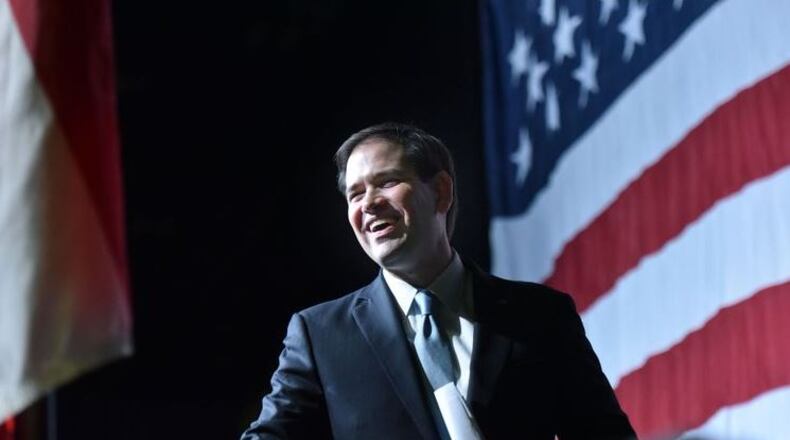The Republicans’ 2016 presidential primary, which made a stop at the Georgia GOP convention in Athens today, resembles even more than in most years a series of high-wire balancing acts. There’s the line between reviewing the bad policies of the current presidency and offering a clear look ahead. The line between addressing the people’s anxieties and going full-tilt populist. The line between taking traditional conservative stances and broadening the party’s base of supporters.
Marco Rubio took his turn on the tightrope this afternoon, addressing a convention hall that was still filling up and a crowd that was still warming up. The first-term senator from Florida decried “our outdated leaders” who are “wedded to ways of doing things that no longer work as well as they once did.” Electing someone with a more forward-looking vision, he argued, is key to ensuring the 21st century is another American one.
But what does that mean? How do Republicans and their policies need to change, and how do they need to stay the same?
“I think our principles still work, of limited government and free enterprise, but they have to be applied to the unique challenges of our time,” Rubio said in a post-speech interview. “For example, we all believe in higher education, but higher education in the 21st century has to mean something different than it meant in the 20th. It has to mean more vocational training, because there are good-paying jobs that require more than high school but less than four years of college.”
Rethinking higher ed, he said, along with other reforms from taxes to regulations to energy policy, has to be done “because it makes us more globally competitive, not just to serve some ideological end.”
Much the same goes for Rubio’s embrace of a robust defense, which on the surface sounds a lot like the talk of a 20th-century Republican.
“It is still true that the world is a better place when America is the strongest country in the world,” he argued. “But the nature of the challenges of the 21st century are different from the ones of the 20th century. The 20th century, its first half was defined by two world wars, and its second half was defined by the conflict between the free world and communism and the Soviet Union. Neither one of those are around today. What’s around today is the rise of authoritarian governments in China and Russia who are trying to subjugate their smaller neighbors. What’s true now is the rise of non-state actors, radical jihadists. And what’s true now is (there are) rogue states like Iran and North Korea that have either acquired or are trying to acquire nuclear weapons.”
Those challenges may be different, he said, but the solution -- a leading role for the United States -- is not. “There’s this kind of thinking out there that … now’s the time for America to retreat from the world,” he said. “Every time we’ve done that, it’s led to chaos and uncertainty.”
Expect uncertainty, and its resolution, to be a major theme of the 2016 campaign; many Americans are still doing their own balancing acts six years after the end of the Great Recession. That will take a combination of the familiar as well as the future, a union that seems to suit Marco Rubio well.
About the Author
Keep Reading
The Latest
Featured


